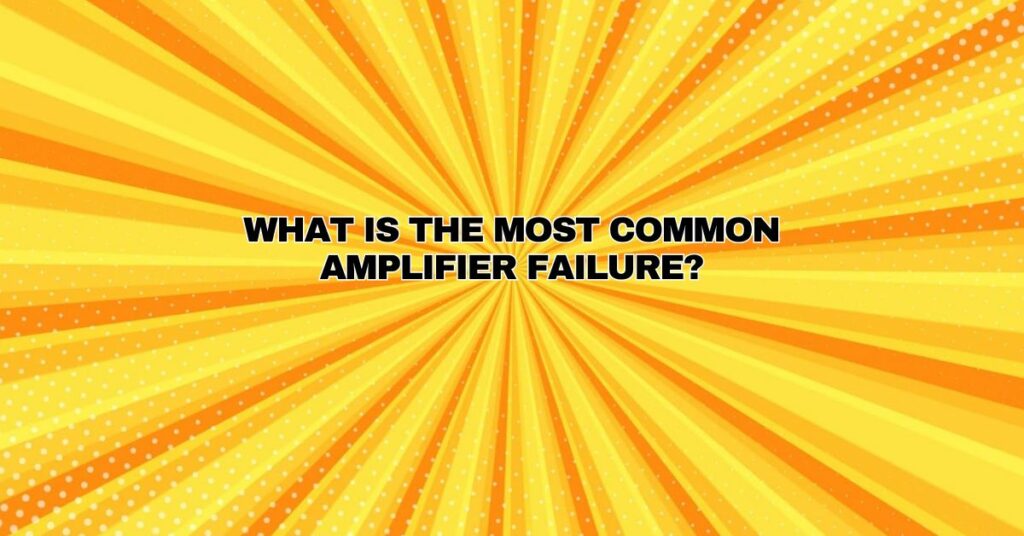Amplifiers serve as the backbone of audio systems, providing the power and clarity needed to bring music and sound to life. However, like all electronic devices, amplifiers are susceptible to various forms of wear and tear that can lead to malfunctions and failures. In this article, we will explore some of the most common amplifier failures, their causes, and potential solutions to help you troubleshoot and address these issues effectively.
- Overheating and Thermal Failures
One of the most prevalent amplifier failures is overheating. Overheating can result from prolonged use at high volumes, inadequate ventilation, or the accumulation of dust and debris inside the amplifier. The consequences of overheating include:
- Reduced Lifespan: Continuous exposure to high temperatures can cause components such as transistors and capacitors to degrade prematurely, shortening the amplifier’s lifespan.
- Thermal Shutdown: To prevent damage, many amplifiers are equipped with thermal protection circuits that automatically shut down the amplifier when it reaches a critical temperature. While this protects the amplifier, it interrupts the listening experience.
Solution: To prevent overheating, ensure that your amplifier is placed in a well-ventilated area, free from obstructions. Regularly clean dust and debris from vents and cooling fans. Avoid running the amplifier at maximum volume for extended periods.
- Clip and Distortion
Clip and distortion are audible issues that occur when an amplifier is pushed beyond its capabilities. When the input signal surpasses the amplifier’s maximum output, it clips, resulting in a distorted and harsh sound. Common causes of clipping and distortion include:
- Inadequate Power: Using an amplifier that is underpowered for the speakers can lead to clipping when trying to achieve high volume levels.
- Improper Gain Staging: Incorrectly setting the amplifier’s gain control or using an excessive input signal can cause distortion.
- Overdriving Input Signals: Feeding an amplifier with an excessively high input signal, such as from a source device, can lead to distortion.
Solution: Match your amplifier’s power output to your speakers’ requirements. Carefully adjust gain settings and avoid overdriving the input with excessively high signals.
- Intermittent or No Audio Output
Experiencing intermittent audio output or no sound at all is another common issue. This problem can have multiple causes, including:
- Loose or Damaged Cables: Loose or damaged cables, connectors, or speaker wires can disrupt the audio signal flow.
- Faulty Internal Connections: Internal connections within the amplifier can deteriorate over time or become loose, leading to intermittent audio issues.
- Component Failure: Amplifiers may experience component failures, such as a blown fuse, damaged transistors, or malfunctioning capacitors.
- Overheating: As discussed earlier, overheating can cause the amplifier to enter thermal protection mode, resulting in audio interruptions.
Solution: Check all external connections for tightness and signs of damage. Inspect internal connections if you are comfortable doing so, or seek professional assistance. Replace any blown fuses or damaged components.
- Hum and Noise
Hum and noise in the audio signal can be particularly frustrating. These unwanted sounds can be caused by various factors, including:
- Ground Loops: Ground loops occur when there are multiple paths to ground within an audio system, resulting in interference and hum.
- Poorly Shielded Cables: Low-quality or poorly shielded audio cables can pick up electromagnetic interference from nearby electronic devices.
- Dirty or Oxidized Connectors: Dust and oxidation on connectors and jacks can introduce noise and static into the audio signal.
Solution: Address ground loop issues by using ground loop isolators or ensuring that all components in your audio system share a common ground. Invest in high-quality, shielded audio cables and regularly clean and maintain connectors and jacks.
Conclusion
While amplifiers are essential components of audio systems, they are not immune to common failures and malfunctions. Overheating, clipping and distortion, intermittent audio, and hum and noise are among the most frequent issues that users encounter. However, understanding the causes and implementing preventive measures and solutions can help you troubleshoot and resolve these problems effectively, ensuring that your amplifier continues to deliver the high-quality audio performance you desire. Regular maintenance, proper usage, and occasional professional servicing can also contribute to the long-term reliability and longevity of your amplifier.


